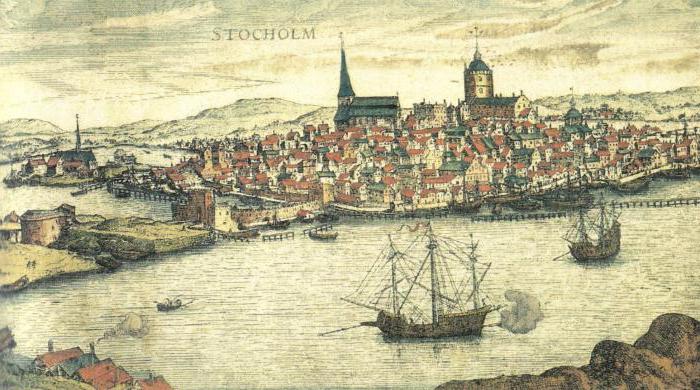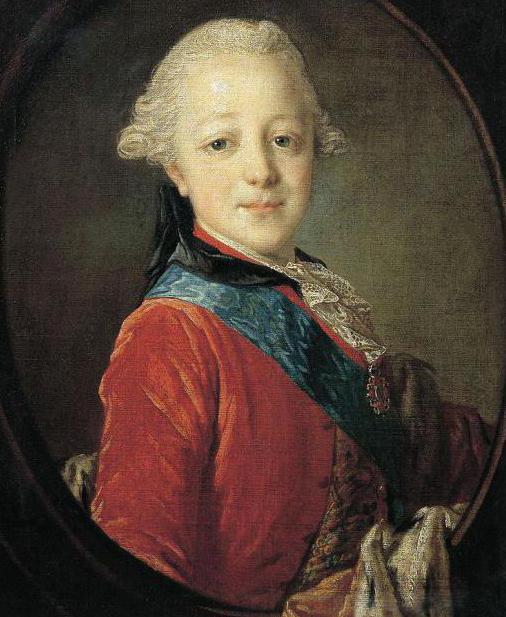Count Panin Nikita Ivanovich - a high dignitary under the Empresses Elizaveta Petrovna and Ekaterina Alekseevna, an intelligent and delicate diplomat, tsarevich’s educator, creator of the first Russian constitution, which was supposed to limit the autocracy. This is a brief description of his activities at the court of two empresses. And now we will take a closer look at the character traits of Count Nikita Panin. His biography is filled with careful maneuvering, and yet he died in disgrace.
Young years
Nikita Panin was born in Danzig on March 31, 1718, in a family of nobles, not particularly wealthy, but quite prosperous. They believed that their ancestors were Italians from the city of Lucca. Three years later, his younger brother Peter appeared. The brothers carried their friendship through life. In the fortress of Pernov, his father was a commandant. They grew up there and received a home education. According to custom, Count Panin was enrolled in the Guards Regiment from birth. At 22, he had the rank of cornet and served at court.
Diplomatic activities
After the coup of 1741, there were continuous festivities at the court. The merry Empress Elizaveta Petrovna turned her attention to the young and handsome guardsman, who had already received the rank of chamber junker. According to one legend, he overslept an appointment with an august person. After this, the misconduct was sent to Copenhagen, and then to Stockholm in 1747. Perhaps it was different. Here palace intrigues played a role, according to which the place of the favorite should not belong to Panin, but to the younger and more beautiful V. Shuvalov. One way or another, the courtier turns into a diplomat, his biography changes dramatically. Nikita Panin was “stuck” as a messenger in Stockholm and spent 12 long years in it.

Then it was a small, boring, cold and damp city. Nikita Ivanovich did not waste time. He read a lot, studied the monarchy of Sweden, which was limited by parliament. His worldview has changed. Count Panin became a supporter of the constitutional monarchy, a cautious and intelligent diplomat and politician. As a thinker, he was captured by the ideas of the Enlightenment, moreover, he came to the conclusion that Russia should fight with England for influence in the Baltic.
A new round in a career
His patron, Chancellor A.P. Bestuzhev-Ryumin, fell into disgrace in 1758, and Panin Nikita Ivanovich resigned, but unexpectedly for everyone and himself in 1760 he received a high position from Elizabeth I - the tsarevich Pavel Petrovich's teacher, who was seven years.
Panin: teacher and diplomat
Count Panin received a "key" place. He could influence the future of the Russian monarch. Many courtiers did not want to see Peter III on the throne of a foreigner, distinguished by an eccentric character. They preferred that the country under their leadership be controlled by the young Paul I. But it turned out differently, the power was seized with the help of the Orlov brothers by Ekaterina Alekseevna.
Count Panin fully supported the ambitions of the new ruler and ensured a quiet life for himself and his pupil. At the same time, he served as a diplomat, receiving the post of Privy Councilor and Senator, at the court of the young Empress Catherine II, still inexperienced in foreign affairs. Together with her, he became the creator of the Union of the Baltic States under the leadership of Prussia and Russia.
N. Panin - educator
And what about young Paul? No, he is not forgotten by Nikita Ivanovich. They are sincerely attached to each other. Panin, in a playful, unobtrusive way, tried to instill in his pupil the ideas of constitutional monarchy. The benevolent, always in store heap of jokes and instructive stories, the wise Nikita Ivanovich did not torment the prince with instructions and gave him a lot of freedom.

In fact, he replaced his parents. The growing young man was attentive to the ideas of Nikita Ivanovich, which the empress did not like. As soon as Pavel was 17 years old, Panin was removed from office. Both: both the teacher and his pupil, deeply experienced the disgrace, beautifully furnished. He was given four thousand souls of peasants, one hundred thousand rubles, a silver service that cost five thousand rubles, a house in St. Petersburg, provisions and wines for a year, livery for servants, crews, an annual salary increase of five thousand rubles already fourteen available. However, Panin until the end of his life retained influence on Pavel Petrovich, who used his advice.
Reason opal
In 1762, Nikita Ivanovich drafted a project according to which an unlimited monarchy was limited by a rigid framework, and the Senate was divided into departments. The empress didn’t really like the first part and was remembered for a long time, and she took the second to action.
Experienced diplomat
At the same time, Panin was indispensable in matters of foreign policy. For almost twenty years, together with the empress, he led the College of Foreign Affairs. In 1763, he became a senior member of the College. A gentle and kind man, he talked so skillfully that no one ever heard of his refusals, and, listening to his gurgling speech, foreign diplomats forgot about their main goal.
Speaking for rapprochement with Prussia under the dominant position of Russia, he and Catherine II created an alliance of the northern states that opposed England (the Northern Chord). He opposed the partition of Poland and the strengthening of France.
In 1765, an agreement was concluded with Copenhagen, in 1766 - an agreement with England on trade. In the years 1768-74 after the Russo-Turkish wars, the direction of the policy of Catherine II changed, and Panin ceased to be necessary for the Empress. In 1769, Count Panin was involved in a conspiracy that was preparing the overthrow of the empress and the enthronement of Grand Prince Pavel Petrovich, who vowed to abide by constitutional conditions by limiting the monarchy. The plot was uncovered, but Panin was gently removed from the court and the Grand Duke. In 1780, during the liberation of America from English colonization, he developed a declaration of neutrality for the country. In 1781, he completely retired.
The first Russian constitution
It consisted of two parts.
The first, introductory, explained why a country needs a government that obeys laws. How relevant it has been developed for all times by Panin Nikita Ivanovich. The history of modern Russia is a vivid evidence of the correctness of the views of an 18th-century politician. Power is entrusted to the ruler, so that he acts for the benefit of his subjects, the people should choose the ruler. This is the basis of power - its electiveness. He considered private property a political basis. And what lay at its source? Panin did not say this, but the conclusion suggests itself: the possession of serfs. If you destroy serfdom and give free rein, then what will happen? We know the answer to this question since 1862, but then it was not clear.
Further, Count Panin Nikita Ivanovich did not manage to develop a clear concept. He sketched only the headings, from which it was clear that the ruler of the country should be Orthodox, but all other religions are not oppressed. The succession to the throne should be streamlined, which was subsequently done by Pavel Petrovich. The rights of the estates were not specified, but were indicated in the headings. Courts should only act publicly. Taxes are introduced only after discussions in the government. After his death, he bequeathed this constitution to the heir, his beloved pupil, but he did not receive it. Brother Panin, Pyotr Ivanovich, seeing the changes in the character of Pavel, did not give him the document. Only fragments recorded by his secretary D.I. Fonvizin have survived to this day.
When N.I. Panin died in 1763 at the age of 65, Pavel Petrovich sat at his bedside and held his hand. Having come to power, he erected a monument to his teacher in the church of St. Magdalen in Pavlovsk.
Personal qualities of Count Panin and interesting facts from his life
Kind and soft by nature, he was a big sybarite. I didn’t get out of bed earlier than noon, I was never in a hurry, I was very lazy and never took bribes. He was not greedy, given to him serfs Nikita Ivanovich divided between his secretaries, including D.I. Fonvizin, the future playwright, received his share.
N.I. Panin, a lover of good food, had the best chefs in the city. At the same time, he himself could take up the preparation of the dish: boil oysters in beer and burn his own cuff. And he could not be healthy in the morning, having dinner too tightly in the evening with watermelons. He was not married, but he courted the beautiful half of humanity with pleasure. He was also a freemason.
For us, his descendants, Count Panin was remembered as an outstanding diplomat who brought considerable benefit to Russia and strengthened its position among Western states.